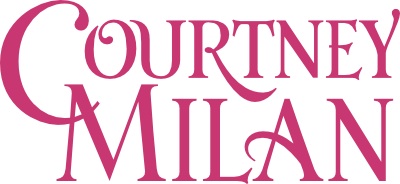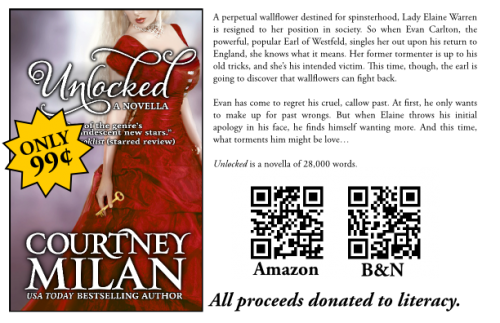This is a very long blog post about why I believe it is unethical for agents to publish their clients.
Before I start, I just want to encourage people who disagree with me to speak up more. Blog posts can take on a bit of an echo-chamber approach, and I know everyone who read my last post didn’t agree with it. It’s okay to disagree. And the fastest way to hash things out in a changing industry is to actually talk to each other, instead of going and sending furious e-mails to friends and creating an echo chamber of your own. You can call me whatever names you want. You can tell me why I’m wrong. I won’t mind. In fact, I approve. But since I’m also trying to finish a book, I’m turning off my internet for the vast majority of the morning, and so I probably won’t even know until I hurriedly read through everything in the afternoon.
That also means I’m not going to be able to do much policing or moderation until I get home–and my apologies for that.
Also, please read my post from earlier this morning. Yesterday’s open letter to agents painted with too broad brushstrokes. I’m appalled by what some agents are doing, but I have also been so heartened by the way that other agents have reacted. Many agents have deep integrity and respect for their clients, and are doing their best to become experts over a field that is changing so fast that even the main players scarcely understand what’s happening. They’re doing their best to guide their clients through these changing times. I shouldn’t have implied that all agents were at fault.
Where I’m coming from.
It’s not a surprise to long-time readers of this blog that my background is as a lawyer. That means that when I talk about professional conduct, I’m talking about it from the point of view of someone who’s in a profession which is often maligned for its lack of ethics–and that means that those of us who care deeply are taught, and required to remind ourselves on a regular basis what ethics mean.
But we’re not just aware of ethical behavior for lawyers. Lawyers are often required to counsel other clients about the appropriate standard for behavior. Lawyers counsel corporation board members, doctors, and so forth on the appropriate standards for ethical behavior. We have to think about what professional occupations are, what they do, and what purpose they serve.
If you haven’t already been able to tell, I try to walk as upright a road as I can in everything that I do. That means that I take the concept of professional ethics very, very seriously–in all my professions–and it bothers me when others pay short shrift to the notion. It especially bothers me when they pay short shrift but obviously don’t understand, and haven’t considered, the ethical considerations.
That being said, my expertise in law is not focused on either the fields of professional responsibility or agency law (which are the areas that this touches on). Not that you should be taking legal advice from random strangers on the internet anyway, and not that this is legal advice. There are some areas of law I know huge amounts about, but let’s just say that my class on business entities was the one where I spent the most time checking election results, and that my understanding of fields that are predominantly state law in the US (family law, agency law, most corporate law, among others) is probably the worst out of all legal fields.
So I’m coming from the standpoint of someone who cares about ethics, is informed of the general principles, has seen enough train wrecks to cringe, but is not an expert at particulars.
Also: if you haven’t noticed by now, I can be pedantic, and I state everything in firm terms. The last is a function of being a lawyer, the former a function of being a teacher. I know it gets on some people’s nerves. But I’d rather be corrected if you think I’m wrong. I do try to listen. And this would be a lot more useful as a conversation if people who see things differently than I do actually engaged and tried to make me see your point of view.
I’m not trying to preach to the choir. I would love it if people who are on a different wavelength actually tried to explain where they are coming from. I don’t promise to agree with you, or not to argue with you, but I’ll listen and try to see where you’re coming from, and if you convince me, I’ll admit it, and if you don’t, I’ll explain why.
So, on to Courtney being pedantic.
A basic explanation about what I mean by “unethical” behavior.
I realize that when I say that behavior is unethical, many people immediately assume that I’m saying that it is immoral–on the level of lying, cheating, or fraud or the like. That isn’t always the case. Professional ethics are standards of professional accountability. Sometimes–often–they will bar immoral behavior. But quite often, what professional ethics determine are not what is immoral, but what is merely irresponsible. (This is why, for instance, the ABA’s code on legal ethics is officially called the Model Rules of Professional Responsibility.)
So when I say that something is “unethical,” I am not saying that the person is a sinner who will burn in agency hell. I am saying that the person is taking a tack that I believe is professionally irresponsible, based upon common law rules of fiduciary accountability.
Technically, I think that I would use the “ethics” label to apply to codes of professional responsibility for the classes of professionals who owe fiduciary duties, duties of confidentiality, and or duties of good care, to their clients. Other people might expand the classifications.
Thus, for instance, it’s often not considered immoral for two consenting, unencumbered adults to sleep with each other. (Er, depending on your view of morality. I guess that’s a tell as to how I see the world, but try not to let my lack of morals on this point distract you.) But it would be unethical for a lawyer to sleep with a consenting client. There are a lot of reasons for this–for one, it might prejudice the lawyer’s view of the case; for another, the client might lose the ability to confide aspects of the case to the lawyer because of the emotional relationship.
It’s not immoral for you to tell a friend that your brother-in-law is starting a business and is looking for venture capital, and you think it’s a good opportunity. But if you’re a stock brocker, it is unethical–professionally irresponsible–for you to suggest to your client that your brother-in-law’s business is a good investment opportunity. You may think it’s awesome, but he’s your brother in law, and with your emotions engaged, you cannot give objective advice.
Professional responsibility means that there are plenty of things that are not immoral in the general course of things, but that one person must refrain from doing under certain circumstances, because the professional relationship they are in prevents them from doing so.
A few general notes on professional responsibility.
You can’t be someone’s lawyer and their lover. You can’t be someone’s therapist and their stock broker at the same time. If you are in a position of trust with someone, it is professionally irresponsible to put yourself in a second position which is in conflict with that position of trust. So, for instance, if you’re sleeping with the client who you’re representing in a criminal case, the client may feel that he can’t confide details in you that are necessary for prosecution of the case–for instance, that he is innocent, and his alibi is the person he was cheating on you with. If someone trusts you with the innermost secrets of their family life, they’ve reposed so much trust in you as a person, that a business relationship with them could easily take advantage of that trust.
Of course, therapists and doctors and lawyers are regulated by statute; agents are not. But that doesn’t mean that agents are not regulated at all. Agents are fiduciaries for their clients, and even though there is no regulation of agents by statute, they are regulated under the common law.
I’ll be more specific later.
Agents who provide services to their clients are fine.
Let’s be clear. I think there are a lot of services that agents can provide to their clients that do not cross the ethical line. I think agents can assist authors with self-publishing in exchange for 15%–connecting them with editors who match the author’s style (this is huge), vetting copy-editors and proof-readers (this is huge), finding good cover artists (again, important) and formatters. Agents may be able to act as mini-aggregators, getting their clients places they couldn’t get on their own as a self-publisher. I think all those things are good–it’s between you and your client.
We can argue over and over about whether the agent is providing the client with a good deal, but I think that the services listed above, and more, are services that do not conflict with the agent’s duties.
(I also think that it means that the days of the one-size-fits-all agency agreement are basically over. There’s probably going to be multiple flavors, depending on what the client needs.)
So I’m okay, for instance, with the DGLM model. I’m okay with agents who provide services. My own agency has long provided services above and beyond selling books to publishers, and so long as those services do not create a conflict of interest, I think they are part of the way that agents will work with authors to help build long and satisfying careers.
Agents who publish their clients are engaging in unethical behavior.
The only services that I think an agent must avoid are the following:
* Services that involve self-dealing. That means, the agent can’t sell the author to her own publishing house and get a higher percentage of the take. That creates incentives for the agent to not negotiate as hard with competing publishing houses, creates doubt on the part of the author as to whether the agent is really trying to exploit her material.
* Services that invert the principal-agent relationship. In the principal-agent relationship, the author’s essentially in the driver’s seat. That means, if an author says, “I can’t work with that editor; we need a new one,” the agent assisting with self-publishing needs to help her find a new one. (Of course, you can try to clean up the relationship and figure out what went wrong, too.) If the author says, “That cover is crap. We need a new one,” the agent works on finding a new one. If the agent’s vision differs too much from the author’s vision, the self-publishing relationship probably isn’t a good fit. But if the agent is actually publishing the author, what does she do if the author says, “That cover is crap. We need a new one.” What if the author does it four times in a row? Think about that. As a publisher, you are in the driver’s seat. As an agent, you are working for the author. Both those things cannot be true at the same time. I do not believe you can function as someone’s agent if you take the reins from the author’s hands, and I don’t think you can function as a publisher if you don’t take the reins from the author’s hands. These two hats do not fit on the same head.
I have not heard anyone who understands the concept conflict of interest explain to me why providing services that would touch on this are not a conflict of interest. I’ve heard agents say, “I just won’t let it be a conflict” or “our interests are never perfectly aligned, so why bother?” but sorry, those things are cop-outs.
It’s not like the body of knowledge about conflicts is non-existent and we’re working from scratch here. There are ways to deal with these kinds of conflicts to make sure that they’re not causing problems, but as far as I can tell, the people who are taking on these duties aren’t taking the conflict of interest issue seriously.
I’m willing to be corrected. If someone from an agency with a publishing arm wants to explain to me how the are staying faithful to their fiduciary duties, I would love to hear it. Really. I mean that.
But so far, all I’ve heard is “conflict, shmonflict.”
Agents who start publishing arms aren’t bad people.
This is one of the most important points. Just because I’ve called someone “unethical” doesn’t mean I think they are evil. In fact, one of the things every lawyer needs to learn early on about professional responsibility is that people who run afoul of their ethical obligations are often very smart, very intelligent, and very well-meaning. You need to learn that, because otherwise you will think, “These rules don’t apply to me. I’m not a bad person.”
In fact, lawyers are more likely to get into trouble by trying to help out a friend, or trying to go the extra mile and including someone, or trying to push the boundaries of helping a client, then they are to sit in a cold room chuckling evilly about how they’ve just managed to screw someone. Good people make mistakes all the time, and most of the mistakes are not motivated by the desire to do someone harm–quite the reverse.
I’m more disturbed by someone who says, “I will avoid a conflict of interest because if the interest conflicts, I will act as an agent instead of a publisher,” because that tells me that this person has never studied how professionally irresponsible behavior takes place. That’s where it starts–by telling yourself that you can minimize the impact by not doing anything wrong.
No. You minimize the impact of a conflict of interest by not putting yourself in a situation where conflicts of interest will occur.
The way I often hear this come up is often as follows: “But if you can’t trust your agent, why have them?” Or: “I trust my agent, and I don’t believe she would screw me.” I can’t argue with someone who trusts their agent–that’s your decision and your choice. I also think that people who claim that you should trust nobody are just as bad as the ones who say you should repose trust blindly–the complete skeptic is as good at figuring out the truth as the gullible person who believes everything. I don’t have a problem with trusting people.
But for me, personally, it’s just not that simple. Here’s the thing about trust: as a personal matter, I trust people who demonstrate that they understand the process by which good intentions get fouled up, and take steps to insulate themselves from the worst temptations. I don’t think people are “good” or “bad” and you trust the good ones and consign the bad ones to hell. I think most people are well-intentioned but prone to mistakes, and the reasons why some screw up and some don’t is (a) luck, and (b) some people recognize that they are fallible and just don’t put themselves in that position to start with. The person who says, “I’m not going to take that chance” is the person I trust, because I know they’re aware of the risks.
More than that. I believe that the person who says, “It’s not going to be a problem” is someone who is not self-aware enough to avoid problems. And even though I may trust that person’s intentions, I don’t trust their results. I’m fundamentally a process person. I think that people are more likely to save money if they transfer it into a second account, instead of telling themselves not to spend it unless they really need it; I think that the best way to avoid eating too many cookies is not to buy any; I think it’s a good idea to take away someone’s keys before they start drinking; and I think people are more likely to do good because they make themselves keep away from temptation entirely. Process leads to prophylactic rules–meaning they’re by necessity cut larger than they need to be, to avoid harm. They may seem stodgy and weird, but the rules of agency relationship have arisen out of long experience.
As far as I remember, and as far as I’ve been able to ascertain, general agency law offers the same advice: an agent in a principal-agent relationship needs to avoid even the appearance of a conflict. Keep to good process, and you’re not creating a risk. Create a risk, and you’re acting irresponsibly. Even if that risk is never actualized into actual harm, that’s irresponsible.
When someone says, “I trust my agent,” in response to a conflict of interest that arises, I feel like the person who helplessly watches her best friend get in the car with her drunk boyfriend. He might not crash. Most people who drive drunk don’t. But he also might kill her, and I want to scream, “Look, if your boyfriend was worthy of trust, he wouldn’t be behind the wheel.” And the instant someone says to me directly after consuming a six-pack, “Look, I’m good to drive, I don’t know why you don’t trust me,” is the point when I stalk away in a blind fury. If you want to make sure harm doesn’t arise, you don’t put yourself in a situation where your reflexes are slowed, your senses dimmed, and you’re directing a multi-ton vehicle at high speeds.
Agents can be good people, who want to help their clients, and can nonetheless do harm to their clients by creating conflicts. I’ve just seen too many examples in too many other fields for me to simply say it’s a matter of trust. I trust process, and I trust people who believe in good processes.
That’s the lawyer in me: I look at things and think of all the ways they can go south.
This kind of conflict of interest can destroy an agent-client relationship.
I’ve blogged before about the ways in which engaging in self-dealing can lead an agent to steer a client towards deals that aren’t the best for the client. I could spin off horror story after horror story, but I don’t think horror stories are effective, because they make an agent say, “Oh, but I would never do that” and make clients say, “Oh, but my agent would never do that.”
The real horror story of conflicts of interest is not about agents rampaging through a client’s finances and stealing things and being immoral. It’s more subtle than that.
The story can look like this: An agent sends a client out on submission, and gets an offer–a very tepid offer–from a publishing house that is not anyone’s first choice, or second, or sixth. The client is kind of excited about the offer, because, hey, it’s an offer… but she’s not 100% on board. Maybe the agent mentions the publishing arm first. Maybe your client does. And the client decides to go with the agent over the less-than-exciting offer. Why wouldn’t she? The client trusts her agent. The client speaks about her intelligence and her integrity in glowing terms. Both the agent and the client believe that there isn’t a conflict of interest here–the agent is doing exactly what the client wants, after all!
And then. Six months down the line, sales aren’t what you had hoped. You’re nowhere near making up the tiny advance that the client would have got elsewhere.
It’s easy to trust an agent when things are going well. But we all know that when things don’t go well, people naturally tend towards blame. They want to look for reasons–and we all know that in publishing, sometimes there really is no reason, or sometimes the reason is something that’s totally out of our control. But now, the client is looking, and they start wondering: Did my agent fail me? Did my agent not put her all into negotiating a better offer from that house because she wanted to make her own house look attractive? Did she do her fail to place my manuscript before the right people at better houses, because she really wanted to publish me herself?
It doesn’t matter if there’s merit to the argument. The doubt is there. It’s insidious. It’s hard to shake loose, and that’s the kind of thing that can undermine agent-client trust. It’s not big, and it’s not flashy, but it’s real.
This scenario can play out even if the agent never self-publishes the author. If she fails to obtain an offer, is it because nobody offered? Or is it because the agent wanted the manuscript for the self-publishing arm that the agent was setting up, and so set the manuscript up for failure? I have seen this last doubt infect more than one friend who has been on submission this last year from houses where the agent is publishing the book. This is real. It can destroy the agent-client relationship.
Of course, it might not always end in mere doubts. The client, if sufficiently doubtful, may be able to file a lawsuit claiming that the agent violated one of the fiduciary duties that it owes to the principals. Depending on the circumstances, she may be able to force the agent to disgorge any profits she received on behalf of the publishing house. And that really wouldn’t be good for the agent/client relationship, either.
“But,” someone might say, “we agreed when we started that it was okay for me to do this!”
That might not be a defense. I highly doubt that some of the people who are pooh-poohing the notion of conflicts of interest in agency publishing have given their authors a full and complete disclosure of the risks involved.
And besides, there are some ethical responsibilities that simply can’t be discharged by consent and disclosure. For instance, there is no way that someone’s psychotherapist can create a consent and disclosure regime which allows them to also manage that person’s stock portfolio.
I don’t know the precise rules for consent and disclosure at issue here. It probably depends on the nature of the conflict (and there are a lot of potential conflicts), and other things like what state you’re in, and what state law applies, and so forth. All I know is that these things are not easy, and the mere fact that a client agrees to something at one point in the game should not be counted on to insulate you from further harm down stream.
“But,” someone might say, “my client has never mentioned having a problem with my conflict of interest!”
Tough beans. It’s the agent’s job to remain free of conflicts, not the author’s job to police them.
A conflict of interest is not something that is decided by the author and the agent. It’s decided by common law. There are real legal principles at issue here. You can’t just make up an answer and think that’s good enough.
If you’re an agent and you want to start a publishing arm, you need to talk to a lawyer who specializes in agency law.
Do I need to say any more? A lawyer who specializes in agency law will be a billion times better to talk to than reading this blog post, and then you can explain to everyone how you set up your in-agency publishing house with an appropriate firewall in a way that avoids conflicts. That’s fine.
But do take it seriously. I’m hearing too many people say things that are too blithely dismissive of the notion of conflict of interest for me to feel easy about this.



